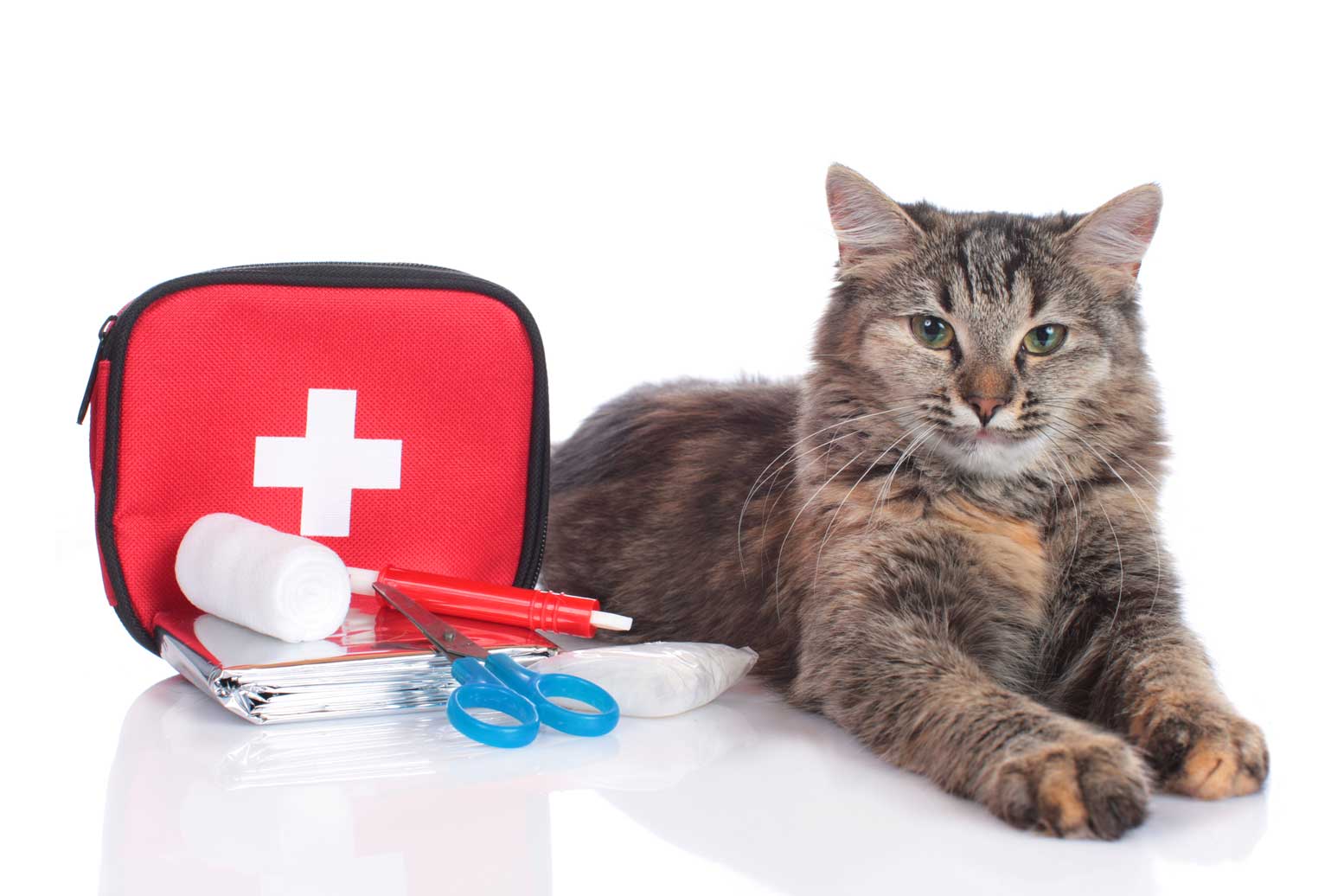April is National Pet First Aid Awareness Month
April 1st, 2019

April is designated as National Pet First Aid Awareness Month by the American Red Cross, making it a perfect time to learn how to care for your precious feline friend in the event of an accident or an emergency. Following are some tips to ensure you are well prepared to handle any emergency.
Keep Emergency Contacts Handy
Keep emergency numbers on hand. These could include your veterinarian's after-hours emergency number and ASPCA’s Animal Poison Control Hotline (888-426-4435). Consider placing these numbers on your fridge door or in your wallet, or anywhere you can access them quickly in case of an emergency.
Sign Up for Training
The best way to be prepared for a pet first aid emergency is to take a class offered by The American Red Cross or your local veterinarian. Practicing CPR ahead of time will leave you better prepared to handle an emergency. You may want to watch informational videos or buy a pet first aid guide as recommended by your veterinarian.
First aid training will help you learn how to check your pet's vital signs including the pulse rate, respiratory rate, etc. You'll also learn how to clean and bandage a wound, and how to protect yourself and others from a frightened kitty's bite. You'll learn to recognize the signs that indicate when a trip to the animal ER is necessary, and most importantly, you'll learn how to perform CPR.
Prepare a First Aid Kit
You can put together a first aid kit, or you can purchase one that's already assembled. Make sure it includes non-stick bandages, self-cling gauze, and paper tape to dress wounds. If your kitty ingests a poisonous substance, it helps to have activated charcoal or hydrogen peroxide on hand. Your first aid kit should also include a thermometer to determine whether your cat is too hot or cold, along with splint supplies, compresses, antiseptic spray, gloves, and tweezers.
Act Fast
If your furry companion experiences an emergency, stay calm and act fast. If your kitty is unresponsive, first check the airway to rule out something being stuck in the throat. Check for breathing and a heartbeat. If breathing is compromised, you will need to start pet CPR. Try to remove any lodged object or perform the Heimlich maneuver if necessary. If there is bleeding, place a compress over the wound and splint any broken bones before moving your furry friend. Call us as soon as possible for care instructions until you can bring your cat in for emergency care.
We Are Here for You
Contact us at All About Cats Veterinary Hospital for more information on how best prepare for an emergency. We are committed to providing you and your feline friend with purr-fectly compassionate and comprehensive care. We are always here for you and your furry family member.
Recent Posts
-
Summer Safety Tips for Cat Owners
July 11th, 2024
-
The ABCs of Cat Vaccinations – What Every Cat Owner Should Know
June 5th, 2024
-
Preparing for Travel With or Without Your Feline Friend
May 3rd, 2024
-
How to Feed Cats in a Multiple-Cat Household
April 8th, 2024
-
8 Tips to Get Your Cat in a Carrier
March 5th, 2024
-
Help, My Cat’s Breath Smells!
February 5th, 2024
-
A Quick Guide to Coping with Cat Emergencies
January 8th, 2024
-
Traveling for the Holidays? 6 Things to Do Before Leaving Your Cat
December 14th, 2023
-
What Is Catnip and Is It Safe for Your Cat?
November 2nd, 2023
-
5 Tips for New Cat Owners
October 5th, 2023
-
How Often Should My Cat Have a Health Check?
September 7th, 2023
-
Cat Hairballs – What Do I Need to Know?
August 4th, 2023
-
How to Play with Your Cat: Fun Cat Activities
July 4th, 2023
-
What to Know About Your Cat’s Surgery
June 10th, 2023
-
Licensed Veterinary Technician or Technician Assistant Wanted (Full time or Part time)
May 15th, 2023
-
Why, Oh Why, Does My Cat Hate Water?
May 9th, 2023
-
What’s Wrong with My Cat? Benefits of Whole-Body Radiology
April 5th, 2023
-
Should I Feed My Cat a Grain-Free Diet?
March 6th, 2023
-
Smelly Cat, Smelly Cat – Causes of Feline Odors
February 22nd, 2023
-
5 Ways to Reduce Cat Shedding
January 3rd, 2023
-
Your Cat’s Holiday Stress – How to Help
December 6th, 2022
-
Pet Cancer Awareness Month: Warning Signs to Look Out For
November 2nd, 2022
-
10 Halloween Safety Tips for Cat Owners
October 3rd, 2022
-
Why Is My Cat So Active at Night?
September 7th, 2022
-
Should I Really Microchip My Cat?
August 9th, 2022
-
Ways to Keep Your Cat Safe and Cool This Summer
July 1st, 2022
-
10 Fascinating Facts About Persian Cats
June 1st, 2022
-
How to Correctly Transition Cat Foods
May 6th, 2022
-
What Your Cat’s Tail Is Secretly Trying to Tell You
April 5th, 2022
-
6 Common Household Items That Are Poisonous to Cats
March 1st, 2022
-
How Do I Know if My Cat Needs Dental Surgery?
February 16th, 2022
-
How to Safely Introduce Your Cat to Your New Baby
January 11th, 2022
-
Giving a Cat as a Christmas Gift: How to Do It Responsibly
December 6th, 2021
-
5 Thanksgiving Foods That Are Toxic to Cats
November 5th, 2021
-
Is My Kitty Depressed? Signs to Look For in a Sad Cat
October 7th, 2021
-
Training Tips for New Kitten Owners
September 7th, 2021
-
Taking Your Cat to the Vet: How to Make It a Stress-Free Experience
August 6th, 2021
-
The Origins and History of the Tabby Cat
July 13th, 2021
-
We are hiring a Veterinary Technician!
July 12th, 2021
-
Kitty Claw Control: How and When to Cut Your Cat’s Nails
June 7th, 2021














